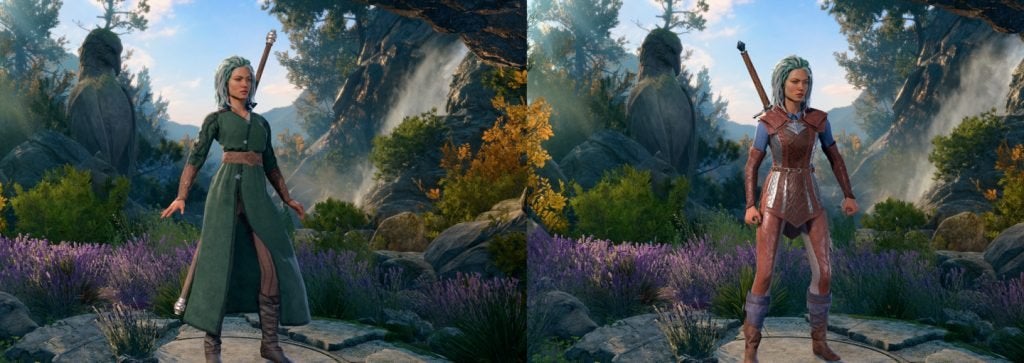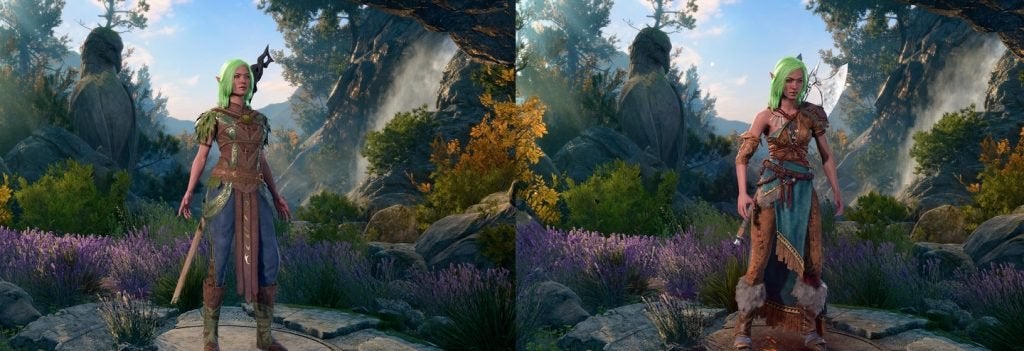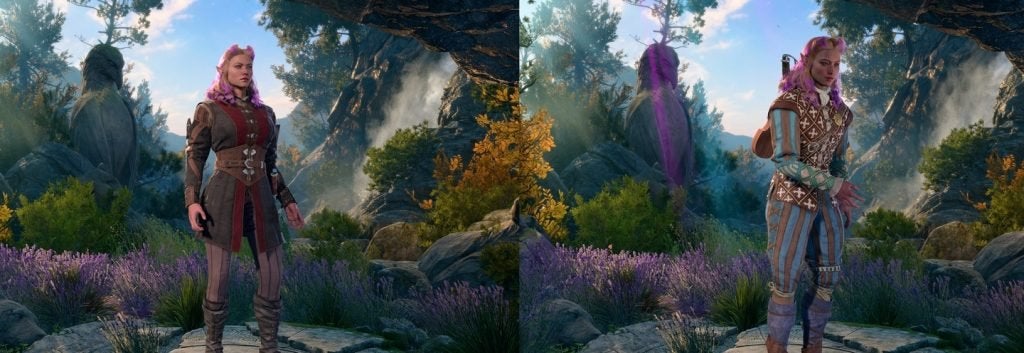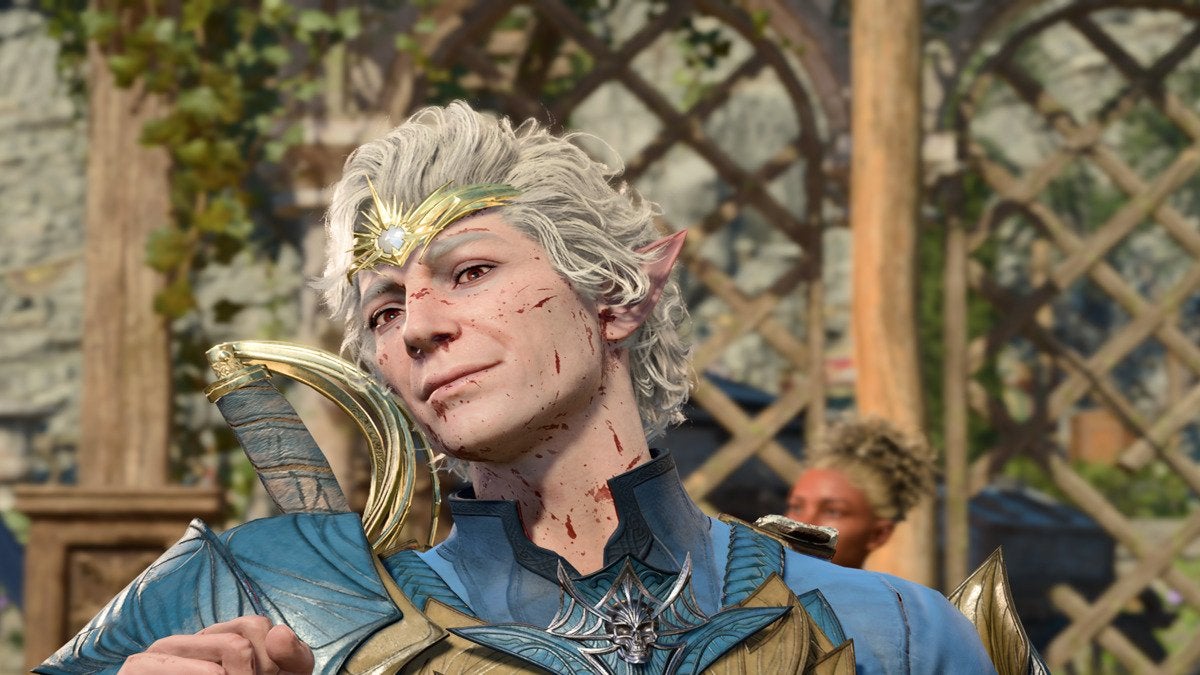![]() Key Takeaway
Key Takeaway
After reaching Level 2, players can select a secondary class for their character. Certain classes blend very well together, boosting your character’s utility both on and off the battlefield and unlocking new attack combinations.
Our favorite Multiclass options include:
- Paladin & Cleric
- Wizard & Fighter
- Bard & Rogue
- Paladin & Sorcerer
- Druid & Barbarian
- Warlock & Bard
- Rogue & Ranger
Choosing your initial class is a tough decision, but did you know that you can also choose a secondary class? Using multiclass combos in Baldur’s Gate 3 can grant players more creative freedom in battle, and combining suitable classes together can transform your character into a more optimized adventurer.
Table Of Contents
About Multiclassing in Baldur’s Gate 3
Mixing and matching the unique features of two distinct classes to create experimental character builds is common in the world of Dungeons & Dragons. Upon reaching Level 2 in Baldur’s Gate 3, players can select a secondary class to bolster their character’s strength and unlock new abilities.
When choosing to Multiclass, it’s important to note that your starting HP is based on your initial class. Additionally, you will not automatically gain the proficiencies associated with your second class.
Each of your classes will level up separately, and there are no Ability Score requirements when choosing a secondary class.
Functionally, Multiclassing can make a character more versatile on the battlefield. Conversely, it can also hamper efficiency if the combined classes aren’t a great mix, and it can keep your character from reaching their maximum potential in their starting class.
For example, while you could create a Fighter/Warlock combo, the former excels in Strength while the latter excels in Charisma. This means that any spell cast would be less effective when compared to the power of a standalone Warlock.
After plenty of experimenting, we’ve chosen a few of our favorite Multiclass combos in Baldur’s Gate 3 that pair surprisingly well.
Paladin & Cleric

A popular Multiclass option in the world of Dungeons & Dragons, pairing the somewhat similar Paladin and Cleric classes will boost your damage output while offering extra support options. Paladins are capable of equipping better weapons and stronger armor, which can help to keep your healer alive during more difficult battles. Additionally, bolstering your skill set with some extra damage-dealing options can give a Cleric more versatility.
Roleplayers also tend to enjoy this mix, as adding a Cleric’s piety to an already holy Paladin can make for some powerful story implications.
Any Cleric subclass will work with this well-balanced combination, so choose the one that best suits your personal playstyle. Siding with a War Domain or Tempest Cleric will complement the Paladin’s offensive skills, but there’s no harm in choosing the popular Life Domain if you want more healing capabilities.
Wizard & Fighter

Spellcasters in Baldur’s Gate 3 can deal incredible damage, but their defenses leave a lot to be desired. The Wizard, in particular, is incredibly easy to kill during early portions of the game. However, Multiclassing with Fighter opens up plenty of helpful proficiencies, including Medium and Heavy Armor to help keep your Wizard from being one-shot.
This Multiclass option also gives your Wizard more helpful options when surrounded by enemies without needing to teleport or fly away.
You’ll only need to reach Level 2 as your Fighter to unlock Action Surge, allowing you to cast multiple high-level spells in a single turn. If you want to play as a terrifying battlemage with some extra heft, give this build a try.
Bard & Rogue

Players wanting to add a hefty dose of chaos to their next playthrough should opt for the curiously powerful Bard/Rogue blend. As Rogues bring Dexterity to the mix, Bards rely on Charisma, making this combination particularly effective outside of battle. Whether you need to pick a lock, sneak behind enemy lines, or persuade an enemy to walk away from a fight, your character will be able to do it all with plenty of sass.
Additionally, choosing the College of Swords subclass as a Bard and the Assassin Rogue subclass as a Rogue will allow you to excel in deadly subterfuge on the battlefield.
At Level 4 and Level 8, you’ll be able to snag some helpful Feats to help this Multiclass shine. We’d recommend grabbing Medium Armor Master and Dual Wielder to boost your AC and enable you to wield two Rapiers for boosted damage.
Paladin & Sorcerer

While Paladins have a few spells to choose from, players wanting a more varied magic selection should consider a Sorcerer Multiclass. Paladins and Sorcerers share the same spell modifier, making this a match made in heaven. It doesn’t hurt that the Paladin will grant some extra defense to the somewhat flimsy Sorcerer.
Investing five levels into your Sorcerer will unlock third-level spell slots, allowing you to wreak all kinds of havoc. This includes casting up to three spells in a single turn or buffing two allies with Haste at the same time. Though this Multiclass option will burn through your resources and demand you take more Long Rests, its raw power is undeniable.
Druid & Barbarian

Combining a Druid—in particular, a Circle of the Moon Druid—with a Barbarian will grant you unrivaled melee strength combined with the handy ability to heal your wounds. With high HP and solid defense, your character will also be protected from multiple attack types due to the Barbarian’s many resistances. (Having the ability to transform into a Bear also seems apropos for a Barbarian, wouldn’t you say?)
Mixing these two classes effectively can be difficult, but the end result is worth the trouble. Getting to Level 8 as a Druid and Level 4 as a Barbarian will grant you the most possible bonuses of both classes. You’ll lose out on your Druid’s Improved Wild Strike ability, but you’ll gain a powerful caster with extra durability on the battlefield and unmatched accuracy.
If you want to deal more damage, reaching Level 10 as a Druid is the ticket to success. However, you’ll rely on Long Rests more often, as you’ll have fewer Rage charges per day.
Warlock & Bard

Players familiar with the Warlock class know that these characters are already powerful without any outside help. However, if you’re looking for more utility on and off the battlefield, throwing Bard into the mix is an easy way to do so without a huge level of investment in your Warlock build.
Even a single level in Bard will allow you to utilize Bardic Inspiration, which buffs allies during social encounters or helps them to succeed in Saving Throws. Bringing your Bard to Level 2 will unlock the Jack of All Trades feature, which grants expertise in two skills of your choice.
Rogue & Ranger

Splitting your levels evenly between Rogue and Ranger will transform you into the untouchable assassin of your fantasy dreams. Combining the Gloom Stalker Ranger subclass with the Assassin Rogue subclass will grant you both Dread Ambusher and Assassinate—two moves that can end a battle before it even begins.
By leveraging Misty Step, a spell Rangers unlock at Level 5, you can sneak up behind enemies and utilize your many offensive skills to defeat your enemies before they have a chance to scream. If you’re the kind of gamer who prefers to feel overpowered every step of the way, this is the Multiclass option for you.
It’s worth reiterating that this build relies heavily on stealth. Simply running headfirst into battle isn’t a great way to play this mix of classes.
Choosing to multiclass in Baldur’s Gate 3 can open up all kinds of new and exciting possibilities for your character. It’s entirely possible to mix any two classes together—regardless of how inefficient the blend might be. It’s also possible for your Companions to Multiclass, so why not attempt to create the most powerful party imaginable?


